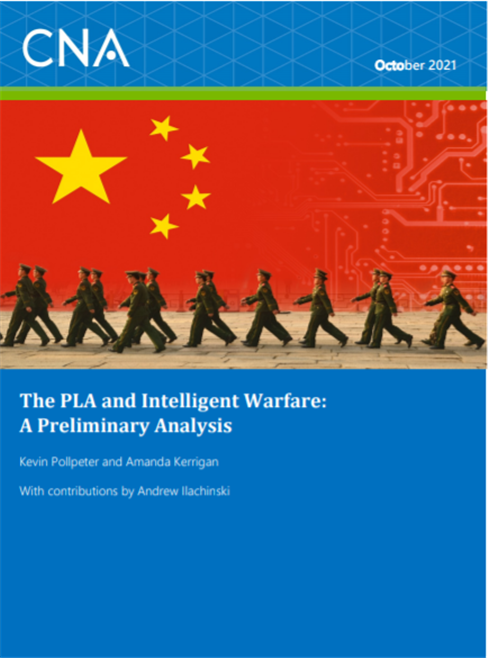The widespread adoption of artificial intelligence (AI) and autonomous weapon systems portends a new revolution in military affairs. The People’s Liberation Army (PLA) is now conceptualizing a future battlefield environment dominated by AI and autonomy, which it calls “intelligent warfare.” This paper explores the PLA concept of intelligent warfare, according to articles by writers from the People’s Republic of China (PRC). It addresses the following questions, based on a survey of 52 articles published between October 2017 and December 2020 by media outlets affiliated with the Chinese Communist Party, PRC government, and PLA.
- How do PRC writers characterize intelligent warfare?
- How do they envision intelligent warfare?
- How do they characterize future battlespaces, and how do they think humans and machines might interact?
- What implications do PRC writers discuss that may result from intelligent warfare?
- What are the implications for the US military?
Characteristics of intelligent warfare
Most PRC writers do not explicitly define intelligent warfare, but describe it as follows:
- A new and advanced stage of warfare based on AI and autonomy
- A combination of human and machine intelligence
- The extensive use of AI in all military applications
PRC writers emphasize the importance of data, algorithms, and computing power to intelligent warfare.
- Data. PRC writers stress that data are the foundation of intelligent warfare. Writers call data the “new oil” and big data the “most important resource” in intelligent warfare.
- Algorithms. The importance of algorithms to intelligent warfare is related to the central role of AI. Some PRC writers envision that warfare will become a contest between competing algorithms.
- Computing power. PRC writers view real-time computing of large amounts of data as essential for intelligent warfare.
PRC writers envision a hybrid command and control system involving humans and machines.
- Most PRC writers envision humans remaining in command of autonomous systems, especially at the strategic level, while exerting only limited control of machines at tactical levels.
- Many PRC writers seemed to be influenced by Marxist and Maoist teachings that humans will remain the most decisive factor in war. These writers make several arguments:
- No matter how advanced intelligent weapons and equipment become, they will still require human innovation, design, production, and management.
- War is still a conflict between people, and war is ultimately about the ability to influence a human enemy.
- Machines cannot replace the ingenuity, creativity, and flexibility of humans.
- A minority of PRC writers contend that over time machines will completely replace humans because of the extreme speed and complexity of future warfare.
PRC writers conclude that intelligent warfare will expand the battlespace.
- PRC writers argue that AI and autonomy will expand warfare into outer space, the deep sea, and the polar regions, where humans cannot easily operate.
PRC writers conclude that the cognitive domain will become more important in intelligent warfare.
- PRC writers argue that militaries will seek to influence an adversary’s perceptions through the denial, degradation, and manipulation of data and algorithms and the denial and degradation of computing systems.
DISTRIBUTION STATEMENT A. Approved for public release: distribution unlimited. Public Release.
Details
- Pages: 46
- Document Number: CRM-2021-U-030806-Final
- Publication Date: 10/1/2021
